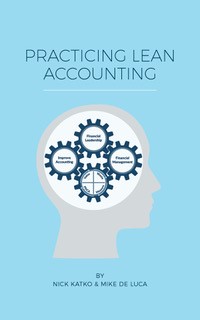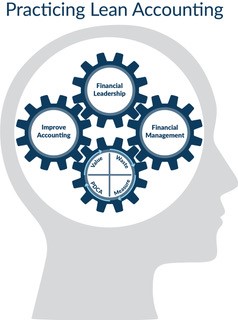by Nick Katko, president of BMA
[Nick Katko will teach his workshop, Practicing Lean Accounting, at AME Dallas 2022. Register by 12/31/21 to save 40% on the conference. Workshop registration will open later and is not included in the base conference registration price.]
 We’ve been asked many times, “How do you get started with lean accounting?” Our answer is always the same: “It begins with thinking.” This response usually confuses people, because they are usually eager to begin “doing lean accounting.” But lean accounting is not something that is “done.” That would imply that there is an end-point to be reached. Lean accounting is simply not a single task that can be performed in a straightforward manner. Rather, lean accounting is a collection of new and different practices which change the way accounting approaches its work, its relationships with its customers, and its role in a lean company. Understanding and mastering these lean accounting practices requires thinking differently, so this is the starting point of a lean accounting transformation.
We’ve been asked many times, “How do you get started with lean accounting?” Our answer is always the same: “It begins with thinking.” This response usually confuses people, because they are usually eager to begin “doing lean accounting.” But lean accounting is not something that is “done.” That would imply that there is an end-point to be reached. Lean accounting is simply not a single task that can be performed in a straightforward manner. Rather, lean accounting is a collection of new and different practices which change the way accounting approaches its work, its relationships with its customers, and its role in a lean company. Understanding and mastering these lean accounting practices requires thinking differently, so this is the starting point of a lean accounting transformation.
The way the accounting function works, and the way accountants think, is very transactional. Accounting must process transactions based on specific time-frames: enter invoices daily, pay employees, pay suppliers weekly, close the books each month, and send out monthly reports. These work routines create thinking patterns which focus on getting the work done to meet the deadlines. There is nothing wrong with this thinking, because it creates reliable and respected accounting functions in companies, which is a good thing.
But to grasp lean accounting, the accounting function must expand its thinking beyond transactions, and into practices. Lean accounting is about continuous improvement, which means that the process of striving to improve never ends. Continuous improvement is not transactional, but must be practiced. The old saying “practice makes perfect” is applicable to lean accounting. The more that these new practices are mastered, the better you get at lean accounting.
What is Lean Accounting?
 Lean accounting, simply defined, is the application of lean thinking to all accounting systems and processes, both financial accounting and management accounting. What is unique about lean accounting, compared to other applications of lean thinking, is how it is applied to the dual roles of accounting.
Lean accounting, simply defined, is the application of lean thinking to all accounting systems and processes, both financial accounting and management accounting. What is unique about lean accounting, compared to other applications of lean thinking, is how it is applied to the dual roles of accounting.
The overriding purpose and goal of lean thinking, in any industry, is to serve customers better. In financial accounting processes, what customers want is common knowledge, such as paying invoices on-time or closing the books quickly. In lean financial accounting, it’s about how to deliver these products and services in the least wasteful way possible. Lean accounting is about paying invoices on-time without having to get last minute approvals. Lean accounting is closing the books on-time without working punishing overtime.
Management accounting, on the other hand, is responsible for providing information (products) and consultation (services) to many internal users. The value that internal users receive from management accounting is the “decision-usefulness” of its products and services. Internal users want management accounting to provide clear insight into both financial and operational performance to make decisions that help the company achieve better results. Management accounting deals with the financial management of the entire company.
In lean companies, internal users’ definition of “useful and understandable information” changes because it has to be aligned with lean thinking to help a lean company achieve better results. In lean accounting, this means management accounting must provide quality products (relevant to lean thinking) and quality services (analysis and recommendations aligned with lean thinking).
Lean Accounting Practices
In order to align the accounting function with a company’s lean strategy, it is first necessary for accounting to master four foundational practices:
- Understanding Value. Accounting needs to think differently about who accounting’s customers are, what their needs are, and how accounting meets those needs. Accounting needs to focus its efforts on serving all its customers better beyond transaction processing.
- Identifying Waste. Accounting needs to think differently about how it performs its work. What activities are really helping accounting serve its customers? What activities get in the way or slow down serving customer? Accounting may have gotten so used to performing nonproductive activities that they consider them to be “normal.”
- Lean Measurement. Accounting needs to think differently about how to measure progress and results in a lean company, beyond the monthly financial statements. Improving quality, delivery, inventory, lead times, cost, safety and morale are what is important in lean companies.
- Using PDCA. Accounting needs to think differently about managing and improving day-to-day work and how to begin eliminating all the activities that don’t serve its customers. Incorporating daily lean management practices in accounting processes serves as a “lean classroom” to identify and solve problems.
These four foundational practices are applied to all aspects of accounting’s work to drive improvement and serve customers better:
- Improving Accounting. Accounting needs to look at its processes from a lean point of view rather than simply from a technical point of view. Serving customers better is much more about completing accounting transactions, it’s about creating a delightful experience anytime one of accounting’s customers must deal with the accounting function. Eliminating waste in accounting processes also creates capacity in the accounting function and improves the work environment for accountants.
- Lean Financial Management. Accounting needs to provide useful and understandable information to internal users in a lean company. Accounting needs to lead in terms of aligning information and analytical practices to support a lean strategy and give decision makers the quality information to leverage lean for financial success.
Practice is the key to success with Lean Accounting
Becoming proficient in any field, whether it’s accounting, competitive sports or performing as a professional musician, requires a constant dedication to practice. Professional athletes and musicians never cease their practice regimen — in fact, once they reach professional levels their commitment to their practice may actually increase. When they first started, the practice was challenging and often frustrating, but they stuck with it to get to the professional level.
For accounting professionals, the work they perform, whether it’s an audit, a discounted cash flow analysis, a forecast or applying payments to a customer’s account, is challenging when they first learned it but becomes easier and more effective with constant practice. The same applies to lean accounting. It may seem challenging and frustrating, but lean accounting starts with thinking, and it’s developed and sustained through practice.
This article contains excerpts from Practicing Lean Accounting, written by Nick Katko and Mike De Luca. Practicing Lean Accounting was published August 2021 and is available on Amazon. Its appearance does not necessarily indicate that AME endorses products and services mentioned here. AME is a member of the Amazon Affiliates program and may receive a commission for items sold via links on this page.


